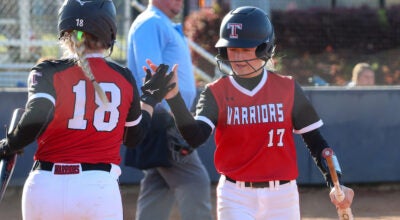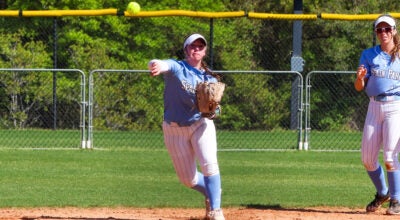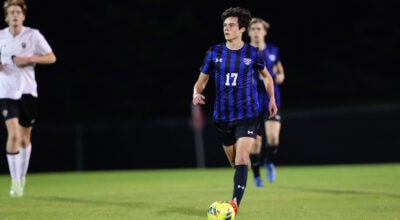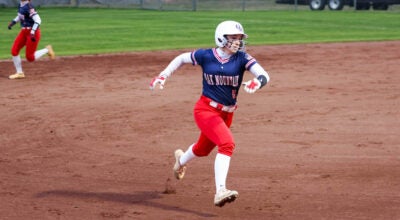Women get away at BOW
Published 4:24 pm Thursday, October 16, 2008
The joke going around the Alabama 4-H Center recently – when can you find 125 women with smiles on their faces all at one time? Easy, the first weekends in March and October each year when the Becoming an Outdoors-Woman (BOW) workshops are held at the center on Lay Lake.
Actually, it’s not a joke at all. It’s reality. Newcomers and veterans alike leave the stress of everyday life and are immersed into BOW’s three-day workshop, which introduces and instructs women ages 18 years or older in a wide variety of outdoors skills. The workshop offers hands-on instruction in more than 50 courses such as backyard wildlife, rock climbing, camp cooking, map and compass, camping, mountain biking, shooting sports (gun safety, pistol, rifle, shotgun, muzzleloader), fishing, hunting, canoeing, nature photography, nature crafts, archery, ATV handling, bird watching, motor boat handling, and more.
“While the goal of the Becoming an Outdoors-Woman workshop is to teach beginners introductory outdoor skills in a non-threatening atmosphere under the direction of patient, enthusiastic instructors,” said Sylvia Payne, BOW coordinator, “it also provides the opportunity for BOW alumni to perfect the skills learned as a beginner and build their self-confidence. That makes them excellent mentors for newcomers, not to mention providing social contact with like-minded individuals.”
Once introduced to the program – no matter how reluctant the start – many of the women become avid BOW devotees. Renee Smith of Jackson is a perfect example.
“In 2003, I came the first time,” Smith said. “I was recently widowed. I was looking for a way to connect with my pine trees. My husband and I had grown pine trees all of our married life. I had a done a little bit of hunting, a little bit of walking through the woods, but it was always behind him. Always. He loved the outdoors. I thought, ‘This will be something I can carry on.’
“It had gotten to the point where I didn’t want to go to the farm. I didn’t want to be there. I had several family members tell me, ‘You need to go back. You need to renew yourself and get in touch with things that are growing, things that are living.’ I kept thinking, ‘Nah, I can’t.’”
Smith then read an article in the Rural Electric Association magazine about the Becoming an Outdoors-Woman program, but she still resisted reconnecting with the outdoors.
“I thought, I’m somebody’s mama, somebody’s wife; I teach school, farming and I can’t take a weekend off,” she said. “Then it dawned on me that I had no reason not to. Then I got to thinking about it. It was in the spring and I decided to do a search on the Internet and there it was. I said, ‘Well, I’ll pack my bags and go, but I’m not going to unpack anything if I don’t like it.’ I got up here and everybody was giggling and unpacking their stuff. I decided it wasn’t so bad. I went to the opening meeting and everybody was whooping and hollering. They told me where to go and I went to the dorm. There were three women there I’d never seen before. They had already unpacked and made their beds. You pick out which bed you want when you get there and you make your bed. Well, my bed was made. I thought this was kind of nice.”
The only commitment Smith would make when she arrived was to change her shoes and put on boots.
“I still wasn’t sure I was going to stay,” she said. “Then later the stories started going and people started laughing. They had to get up and wipe the tears they were laughing so hard. Then I heard people say, ‘I shot a bow today. Did you see what I did?’ Then somebody else said, ‘I shot a gun today. I’ve never shot a gun in my life.’ Another one said, ‘I went canoeing today.’ It just went on and on about what they were doing. And nobody said, ‘you idiot or you didn’t do it right.’ There was laughter everywhere; it was swinging in the breeze. It was such a good time, such a relaxing time.”
When Smith got back to her dorm room, she still hadn’t unpacked. In fact, most of her gear was still in her car.
“The girls asked me where my stuff was and I told them it was still in the car,” she said. “They said, ‘Let’s go get it.’ That’s the way it is here. There’s always a helping hand. Women can be cruel to each other, and they can also be the most nurturing people in the world. There’s a little bit of sister, mama and best friend in everybody. Even people you would not know or have anything to do with, when you get here we’re all the same. We have women who come in on scholarships – they couldn’t afford to come and then they get a letter that they have been invited to attend. The women know that everything you do, every dime you spend, every pin you buy goes to keep the program going. Then you have women you meet and you turn on the evening news and they’re the CEO of some big company. They come here, put on their camouflage and they’re just like everybody else. It’s like when the tiny kids go out and play T-Ball. We’re here, just learning and trying new things.”
Smith obviously stayed that first weekend and was so enthused she called her sister-in-law of 30 years and insisted she join her for the next workshop. The ripple effect continued when Smith and her sister-in-law finished that next BOW.
“On our way home from that one, she said, ‘I can’t wait until my cell phone works, because I’m calling your daughter and she’s coming with us the next time.’” Smith said. “The three women in my room on the first trip, I’m still rooming with two of them. We moved over to a cabin. We bring presents to each other on Friday night. We call it BOW-mas. We sit around and just laugh.”
On the last day of each workshop, the roommates start planning for the next BOW event. Smith said the activities never get old.
“You learn something new each time,” she said. “The thing about the atmosphere here, there’s enough down time. Your instructors have plenty of time. You can take as much time as you need. Or if you want to do something else you can slip away. To me, it’s like paradise up here. You can take a break and read a book. It can be just as exciting as you want it to be, or it can just as tranquil as you want it to be.”
If Smith had to pick a favorite among the classes, she said it would be From Field to Table.
“I learned to dress a deer, cut him up and fry him up,” she said. “I can tell everybody, ‘I did it.’”
Tricia Shipman of Southside experienced BOW for the first time two weeks ago and she also got caught up in the infectious enthusiasm. She also plans to do a little recruiting when she gets back home.
“Dad had talked to me about it for years, and this year I finally decided to come,” Shipman said. “We have a farm outside Fort Payne, so I’ve grown up close to the outdoors. But I love it here (at BOW). Everybody here is so nice. They don’t put pressure on you. They make you feel so comfortable. You do it at your own pace. Anybody who wants to can learn how to do something in the outdoors. I took Pistol I. I had wanted to learn to shoot. I had never shot a bow out of a tree stand. If you have a bad habit, they watch you and correct it, but it’s a constructive criticism.
“I did fly fishing and we had a professional instructor. I’m impressed that they bring in professionals. It’s been a very nice experience. Next time I’m going to bring my step-daughter and my daughter-in-law.”
The next BOW workshop is scheduled March 6-8, 2009. Cost for the weekend adventure is $199, which covers meals, lodging, program materials and instruction. All instructional equipment is provided.
Obviously, the popularity of the program makes early registration a necessity. Visit www.outdooralabama.com/outdoor-adventures/Events_for_women/bow/ for more information about the workshop and to find out when registration is scheduled to begin for the next session.
David Rainer is a weekly columnist Alabama Department of Conservation and Natural Resources Web site, www.outdooralabama.com.









